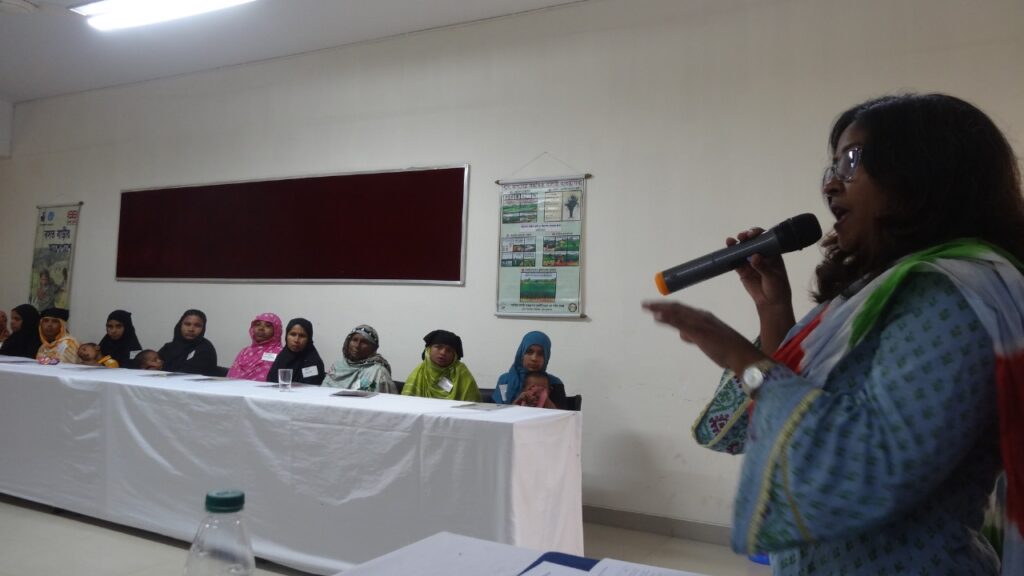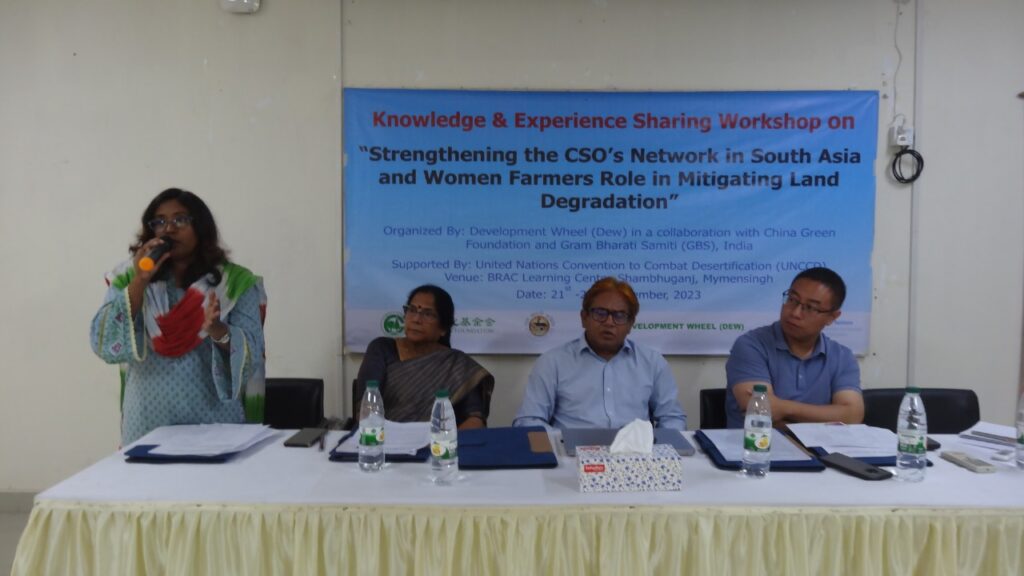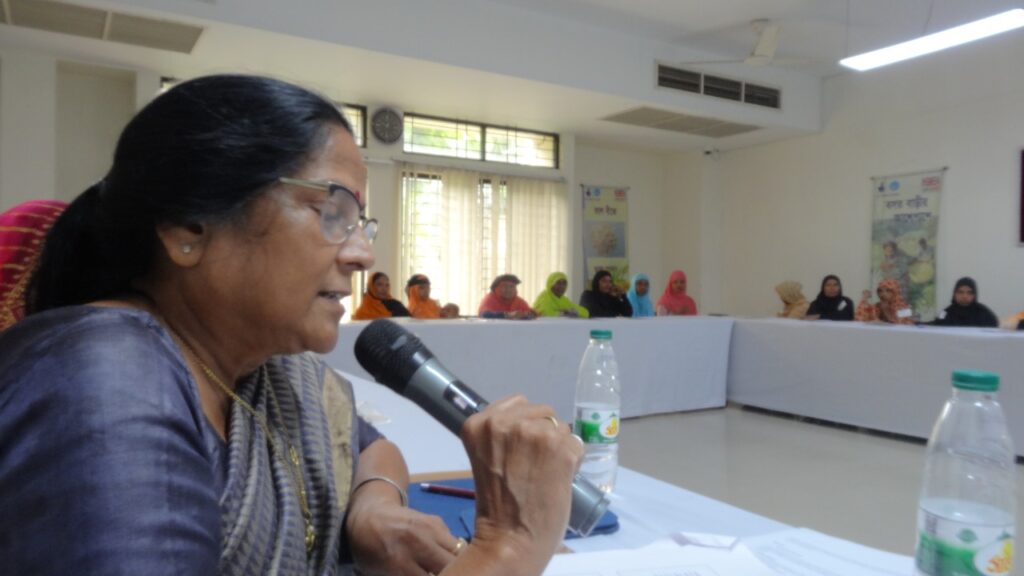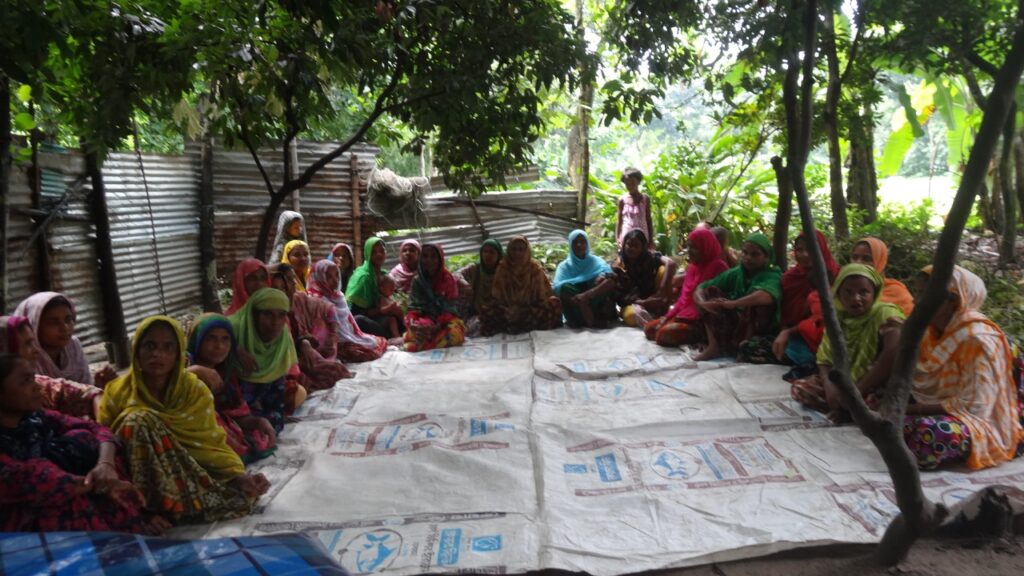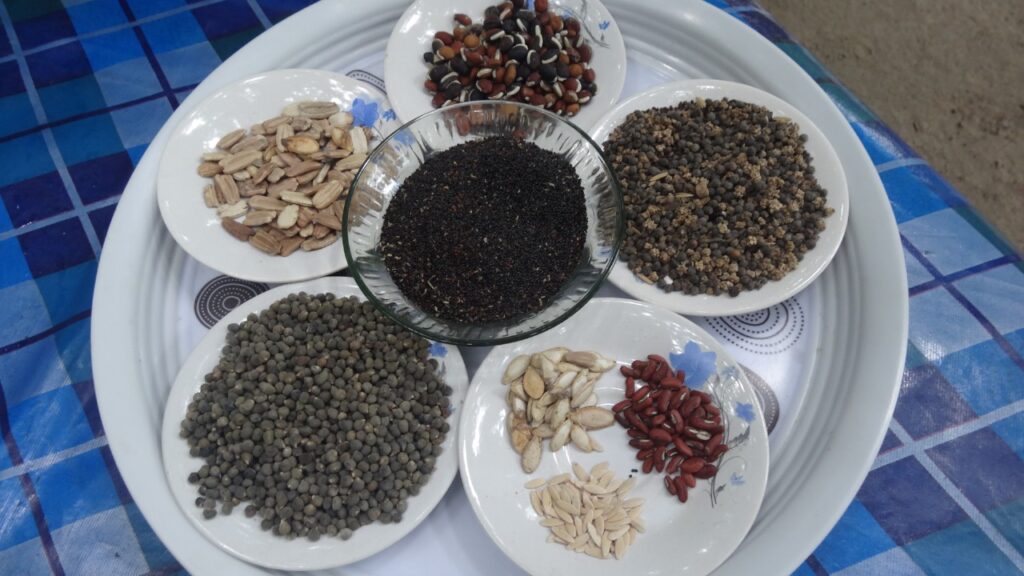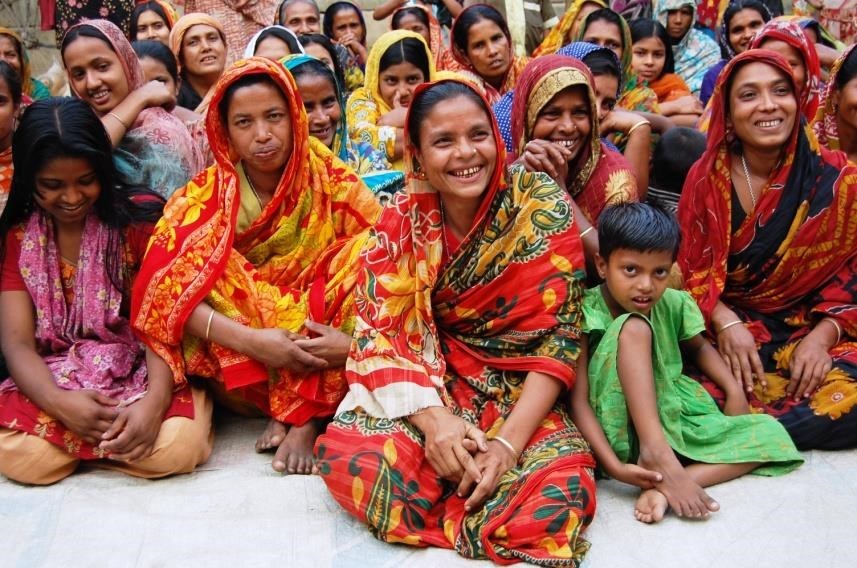
Supported by:
UNCCD
Implemented by:
Development Wheel (DEW)
13-A/4-A (3rd floor), Babar Road, Block-B Mohammadpur, Dhaka-1207
Email: [email protected]
www.dew.org.bd
Developing countries like India, Bangladesh, Pakistan, Nepal which are predominantly agriculture based economy; land contributes and reflects the social economic and political conditions. Majority of the population’s life and livelihoods in the South Asian region depends on agriculture.
The women are 50% of total population in South Asia and majority of them are agriculture labor. They work from dawn to dusk and contribute more labour compared to men, but their labour is not recognized properly. In South Asia women have very significant contribution to food security but it has not been recognized by the society and the state.
They are paid very low compared to the men for works like agriculture and forestation i.e. Plantation, seedling, removing weeds, harvesting crops and obviously post-harvest activities and as well as household work. Women are not entitled to have the lands on their names. Ownership of titles and rights are inaccessible to women, through there is a law, but practically it is not followed.
They are not involved in making decision on agricultural activities including the marketing. Their roles are limited as unskilled agricultural labour and domestic works.
In the context of Bangladesh: Agriculture is the prime mover of the Bangladesh economy, providing largest employment to just fewer than half the workforce and contributing around 20% towards national GDP. A significant proportion of those involved in agriculture are women. As Bangladesh Agriculture substantially shifted towards commercial Agribusiness, the importance of Land Degradation is of utmost importance for farmer’s community especially for women farmers who are contributing a lot to our national economy. Now the small farmers are more actively incorporated in product value chains. There are sporadic “supply-driven” attempts to provide training on LDN, ICT-enabled agricultural information support and other e-services by the UN agencies, Govt., NGOs, private sectors etc. Need of the time is a structured initiative to protect LDN through building capacity of women involved in farming and also need to establish cooperation among Asia region to share and exchange knowledge and experience among farmer communities and for development practitioners to achieve SDG goals 2030 and leave no one behind to achieve the goals.
South Asia, comprising seven countries, is a world within the world. This region is home to about 1.5 billion people or about one-fourth the world’s population that lives on less than 5% of the earth’s land area and among them 50% is female. The region has a total land area of 514 million hectares (Mha) of which 39.5% is arable, 9.6% is permanent pasture, and 15.2% is forest and woodland. The western region of South Asia is arid, and a large proportion of cropland is irrigated by canal and tube wells. Yet, rain fed agriculture is practiced widely on some 123 Mha or 56% of the cropland area in South Asia. Because of the high population density, the per capita cropland area and renewable fresh water resources are decreasing rapidly. Anthropogenic soil degradation is a serious problem throughout the region. Land area affected by different degradation processes is estimated at 55 Mha by water erosion, 24 Mha by wind erosion, 80 Mha by desertification, 17 Mha by salinization, 12 Mha by water logging, 11 Mha by nutrient depletion and large area by ground water depletion caused by excessive withdrawal for irrigation.
The problem of soil erosion by water, especially severe in the lower and middle Himalayas and other regions with undulating terrains, is exacerbated by widespread deforestation, cultivation of steep slopes, and the perpetual use of extractive farming practices. The stagnation or even decline in productivity of the rice-wheat system, practiced on 12.5 Mha in the region, is attributed to soil degradation and nutrient imbalance. The use of traditional biofuels, crop residues and cattle dung used for cooking and heating, adversely impacts air quality and is a serious health hazard. Eutrophication of surface water and contamination of ground water are caused by indiscriminate use of agricultural chemicals, and discharge of industrial and urban effluents into rivers. The environmental problems are also caused by unprecedented and rapid economic development. While improving education in rural areas is an important long-term strategy, the importance of conversion to a prudent land use and adoption of recommended practices of soil and crop management cannot be over-emphasized. Developing clean household cooking fuel is important to improving air quality and reversing soil degradation through use of crop residues and cattle dung as soil amendments. As well as promotion of organic farming is also an important method to combat LDN.
Organizing a experience sharing meeting/Focus Group Discussion-FGD by the Asian CSO’s with the women farmer groups of Development Wheel at Mymensingh, Bangladesh to identify their problems regarding Land Degradation-LDN and share experience from neighboring countries to develop strategies which will significantly contributing to enhance the efficiency of women farmers to mitigate Land Degradation in Bangladesh and the Asian region.
This proposed pilot project for “Strengthening the CSO’s network in Asia and Women Farmers Role in mitigating Land Degradation” is conceived to be more than being a capacity building activity and is meant to increasing the productive participation of women in local agriculture and food production underscoring women’s primary contributions and sacrifices to the growth of the agriculture sector. Beside attempt will be made to include representative from the local farmer community. Certainly education, training and eservices play a very important role for LDN mitigation by women farmers. The program broadly is expected to develop skills on LDN prevention capabilities and enhance their overall farm management potential. The basic real life application of mitigating LDN training will focus on teaching participants with basic concepts and skills so that they can be more productive both at home and in the field on their day to day activities on farming and preventing LDN.
Development Wheel (DEW) will arrange women farmers’ meeting/FGD’s in the field and a sharing meeting/workshop in Mymensingh (North east part of Bangladesh). Ms. Jiajia Luo, CSO panel member from Asia and Deputy Director, China Green Foundation, China – will be speaking as guest speaker from Asian perspective with reference to experience of women farmers in China and Mr. Bhawani Shanker Kusum - President Gram Bharati Samiti (GBS), India and former CSO panel member from Asia - speaking as guest speaker from Asian perspective with reference to experience of women farmers in India along with Mr. Shah Abdus Salam, Founder and Executive Director of Development Wheel, Bangladesh. It will be a unique experience to share knowledge and experience from Asian perspective among the Asian CSO’s which will be strengthening the network. Based on the meeting experience and workshop DEW will prepare a report which will help to develop a broader project on LDN focusing women farmers’ role in South Asia as well as help to develop a multi country project for CSO’s in the south Asia.
DEW has been managing several Development Projects in the target region covering selected areas of
Mymensingh Division and has successfully developed Agricultural & Horticultural Small Farmers’ Group
(Including 40% women and 10% ethnic minority).DEW has build technical capacity of above mentioned Small Farmers, facilitated access to quality Farm Inputs (Seeds, IPM Materials, Biofertlisers etc) through linkage with Private Input Suppliers, provided technological support and organised Buyers-Sellers Meet, and the environmental promotion. The resultant impact is that the target region has emerged as a new Agri/ Horticulture Production Clusters in Mymensingh with small farmers from the neighboring regions are also participating in the same. Among the existing farmer groups DEW will organize representatives (30 women farmers) from different groups to participate the meeting. In addition DEW will organize a field visit to see the actual scenario regarding their real life and livelihoods to China and Indian delegates.
The proposed Project Proposal on “Strengthening the CSO’s network in Asia and Women Farmers Role in mitigating Land Degradation” will be directly benefitted existing farmer group leaders of Development Wheel and the group members in the field.
Development Wheel (DEW) is a non govt. organization founded in 1996 by a few development professionals and researchers to promote self-help poverty alleviation initiatives of the poorest households in Bangladesh. The main focus of the organization is to work for the promotion of the sustainable livelihoods for small scale Agriculture and Arts and Crafts sector producers in Bangladesh through facilitating the development of small enterprises with an aim to generate sustainable self-employment opportunities for under-privileged rural and urban people. Besides, DEW is also active in the fields of climate change, livelihoods security, agricultural promotion, women empowerment, human rights and good governance in partnership and collaboration with different international and national organizations with a vision to have a society where all people will enjoy equal rights, equitable access to employment and adequate resources necessary for their livelihoods and will live in dignity. DEW is a Guaranteed Fair Trade Organization and one of the active members of UNCCD and UN Environment Programme-UNEP.
DEW will collaborate with China Green Foundation, China and Gram Bharati Samiti (GBS), India, Divisional level agriculture extension office of GOB and the existing women farmer groups of Development Wheel (DEW). The project will be supported by the UNCCD.

